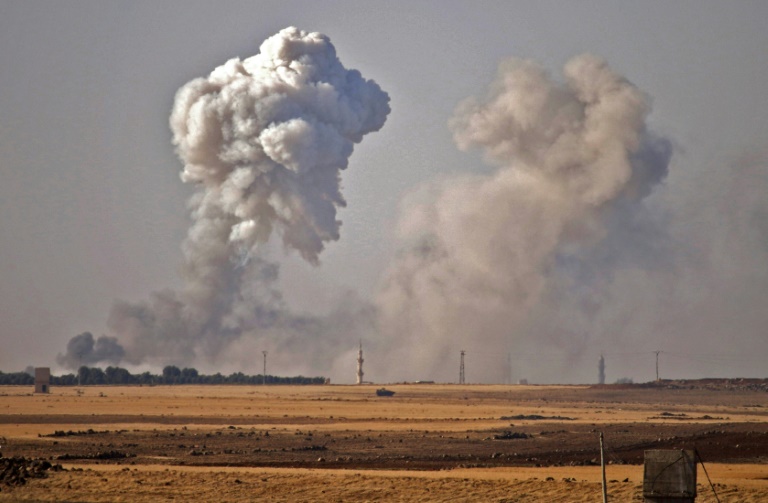
Smoke rises above rebel-held areas of the town of Saida, some 10 kilometres east of Daraa, during reported air strikes by Syrian regime forces on July 4, 2018.(Photo: AFP)
Waves of air strikes pounded rebel-held areas of southern Syria on Thursday as pro-regime forces unleashed their most intensive bombing campaign yet in a two-week-old offensive.
The renewed assault came after the failure on Wednesday of Russian-brokered talks to end the offensive in Daraa province, which has killed dozens and forced tens of thousands from their homes.
The United Nations Security Council is set to hold a closed-door emergency meeting on the offensive later Thursday, but world powers have been able to do little to halt the onslaught.
Throughout the day on Thursday, hundreds of missiles, crude barrel bombs, and air strikes by Russia and Syria slammed into rebel-held towns.
An AFP correspondent on the edge of the rebel-held south of the city of Daraa, the divided provincial capital, said the bombing was the heaviest since the launch of the Russian-backed offensive on June 19.
"From last night until now, Russian airplanes are pursuing a scorched earth policy," said Hussein Abazeed, spokesman for the joint rebel command for the south.
"This is to force rebels to return to negotiations."
Bahaa Mahameed, a doctor working in Daraa's western countryside, said wounded civilians were streaming into his clinic after several days of calm.
"The warplanes are bombing like crazy. We can't even find a safe place to put the wounded," Mahameed told AFP.
Bombing 'not stopped'
Samer Homssi fled to an olive grove on the outskirts of Daraa with his wife and four children because of fierce shelling.
"The bombardment has not stopped for one moment since the announcement that the negotiations failed," the 47-year-old told AFP.
The Britain-based Syrian Observatory for Human Rights said bombing hit the town of Tafas in the northwest of Daraa province and areas near the Jordanian border.
Six civilians, including a woman and four children, were killed in strikes on the town of Saida.
Hours later, regime forces fully retook the town and also seized control of a security checkpoint on the Jordanian border for the first time in more than three years, the monitoring group said.
State television showed footage of columns of smoke and said air strikes were aiming to cut rebel access routes in the southernmost parts of the province.
The regime's main prize, the Nasib border crossing, remains in rebel hands.
After retaking large parts of the country with Russia's help, regime forces set their sights on the southern provinces of Daraa and Quneitra, bordering Jordan and the Israeli-occupied Golan Heights.
Moscow has been brokering talks with rebel towns for negotiated surrenders in a carrot-and-stick strategy that it and the regime have used to retake other territory, including the Eastern Ghouta region near Damascus earlier this year.
More than 30 southern towns have already agreed to surrender, expanding the regime's control of Daraa province to more than 60 percent, double what it held before the offensive.
Russian threats
The talks this week focused on remaining rebel territory in Daraa province's western countryside and the southern half of the provincial capital.
At a meeting between rebel and Russian negotiators on Wednesday, Moscow insisted opposition factions hand over their heavy weapons in one go, while rebels wanted to do so in several phases.
Moscow also reportedly refused requests from some rebels for safe passage to opposition-held territory in other parts of Syria, as was done in Eastern Ghouta and Aleppo.
The rebel spokesman for the south, Abazeed, told AFP that during Wednesday's meeting a Russian negotiator who identified himself as Alexander had threatened renewed strikes from Russian's airbase in northwestern Syria.
"He threatened that if we didn't agree to the deal, 40 planes would leave Hmeimim airport to bomb the south."
Daraa is considered the cradle of the 2011 uprising against President Bashar al-Assad that triggered Syria's devastating civil war.
Nearly 150 civilians have died since the assault in the south began, according to the Observatory.
The offensive has also displaced 320,000 people, according to the United Nations, many south to the border with Jordan or west to near the Israeli-occupied Golan Heights.
Both countries have kept their borders closed, despite mounting calls to let Syrians escape to safety.
The International Rescue Committee said displaced families were struggling to cope with 45-degree heat, dry desert winds and scorpions and snakes.
Children were reported to be hit with cases of diarrhoea and lice after spending more than a week on the border.
World powers have criticised the operation for violating a ceasefire announced last year by Washington, Amman and Moscow.
UN High Commissioner for Refugees Filippo Grandi said that the hostilities were hindering UN efforts to provide cross-border aid from Jordan.
"Thousands of innocent lives are going to be lost, once again, if urgent action is not taken," he warned.


